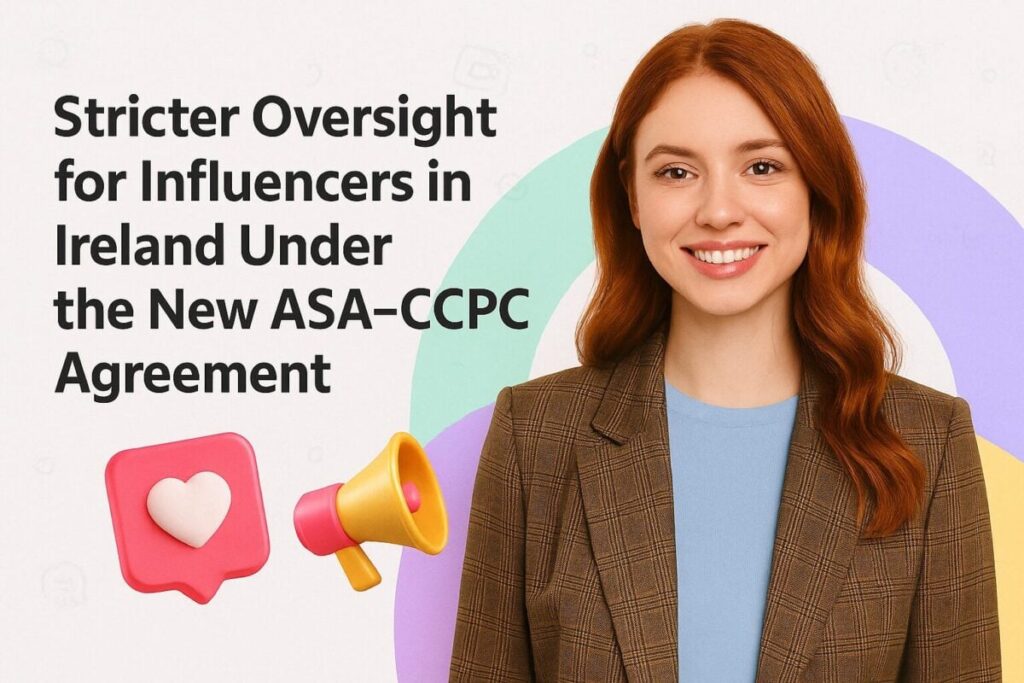Key takeaways
- Eire has formalized stricter influencer promoting oversight by way of a data-sharing settlement between the ASA and CCPC.
- Repeat offenders can now face escalated penalties, together with fines and prosecution.
- Manufacturers and companies should guarantee compliance to keep away from reputational and authorized dangers.
- The transfer aligns Eire with broader EU tendencies of regulating digital promoting transparency.
Enhanced regulatory coordination underscores rising scrutiny of creator-led promoting.
Eire has tightened its regulatory framework for influencer promoting by way of a formal data-sharing agreement between the Promoting Requirements Authority (ASA) and the Competitors and Client Safety Fee (CCPC).
The transfer comes after years of rising concern about hidden advertisements, deceptive promotions, and non-compliant disclosures on social media platforms. Whereas pointers for influencers have existed since 2023, enforcement has largely relied on self-regulation. This new association alerts a shift from advisory oversight to tangible penalties for repeat offenders.
How the Settlement Works
The ASA, which oversees advertising and marketing requirements in Eire, now has the authority to share names, usernames, and photographs of influencers who repeatedly fail to adjust to promoting guidelines.
This knowledge can be handed to the CCPC, which, as a statutory physique, wields stronger enforcement powers. These embrace compliance notices, fastened cost penalties, prohibition orders, and in extreme circumstances, prosecution. By aligning their roles, the 2 our bodies shut earlier gaps the place non-compliance might fall between self-regulation and authorized enforcement.
Learn additionally:
Learn additionally:
Take a look at the EU Takes Aim at Influencer Marketing Practices with New Scrutiny
Client Safety on the Core
On the coronary heart of the initiative is shopper transparency. Influencers are legally required to obviously label industrial content material, whether or not it’s sponsored posts, gifted objects, or promotion of their very own merchandise. Even correctly labelled content material can nonetheless breach shopper legislation whether it is false or deceptive. Regulators argue that clear disclosure shouldn’t be solely about equity but additionally about sustaining public belief in digital promoting, which now dominates how youthful audiences have interaction with manufacturers.
Learn additionally:
Rising Enforcement Stress
The CCPC has already issued compliance notices to outstanding influencers earlier this yr, marking the beginning of a extra aggressive enforcement part. With the ASA now feeding its stories and complaints instantly into CCPC processes, the strain on repeat offenders will intensify.
@marie.doyle #advertising #standards #ireland #irish #influencers #InfluencerTips #AdTransparency #irishcreators #SocialMediaEthics #TikTokShop #affiliatetiktok #support
For the primary time, influencers who ignore transparency necessities face a coordinated regulatory pipeline that escalates swiftly from warnings to potential prosecution.
Learn additionally:
Learn additionally:
Take a look at the FTC Disclosure Checklist by Platform (2025 Update)
Implications for Manufacturers and Companies
The brand new Irish framework doesn’t cease at influencers — it reshapes how your complete ecosystem of advertisers, manufacturers, and companies should function.
Key implications embrace:
- Shared Authorized Accountability: Manufacturers commissioning influencer content might be held accountable if campaigns breach shopper safety legislation. Non-compliant disclosures or deceptive promotions might expose not solely the influencer but additionally the sponsoring enterprise to regulatory scrutiny and reputational harm.
- Stricter Due Diligence for Companies: Agencies managing influencer partnerships will face heightened expectations to observe compliance throughout all inventive belongings. They have to guarantee contracts embrace clear disclosure clauses and that influencer companions observe ASA and CCPC guidelines constantly.
- Status and Belief Dangers: A single breach — even when brought on by an influencer — can undermine shopper belief in a model. Companies and advertisers will want disaster protocols in place, since regulators at the moment are coordinating knowledge and appearing towards repeat offenders extra aggressively.
- Operational Compliance Burden: Marketing campaign workflows will want extra oversight steps, from pre-approval of influencer content material to ongoing monitoring of posts. Compliance checks might decelerate marketing campaign execution, however can be important for danger mitigation.
- Erosion of “Comfortable Compliance”: Influencer marketing is not working in a self-regulated gray zone. With statutory enforcement on the desk, manufacturers and companies should deal with influencer campaigns with the identical rigor they apply to TV, print, and digital promoting.
Collectively, these shifts sign that influencer advertising and marketing in Eire is coming into a extra formalized, tightly regulated period—one the place compliance and creativity should go hand in hand.
Learn additionally:
Learn additionally:
Take a look at the From Marketplaces to Community Power: 2025 Rules of Influencer Marketing
Eire within the International Context
Eire’s tightened oversight displays a broader European development towards stricter regulation of digital promoting and platform accountability. The EU’s Digital Providers Act already requires higher transparency from on-line platforms, and Eire’s strategy reveals how member states are complementing these guidelines with home enforcement instruments.
By specializing in data-sharing and collaboration, Eire is making a framework that will affect how different EU regulators coordinate in tackling influencer advertising and marketing abuses.
Trying Forward
The ASA and CCPC have framed this settlement as an evolving course of, not a one-off motion. They anticipate to broaden oversight as public reporting grows and as extra circumstances of non-compliance floor. For the influencer trade, this marks a defining second: transparency is not non-compulsory, and the results for failing to reveal or mislead at the moment are backed by statutory enforcement.
